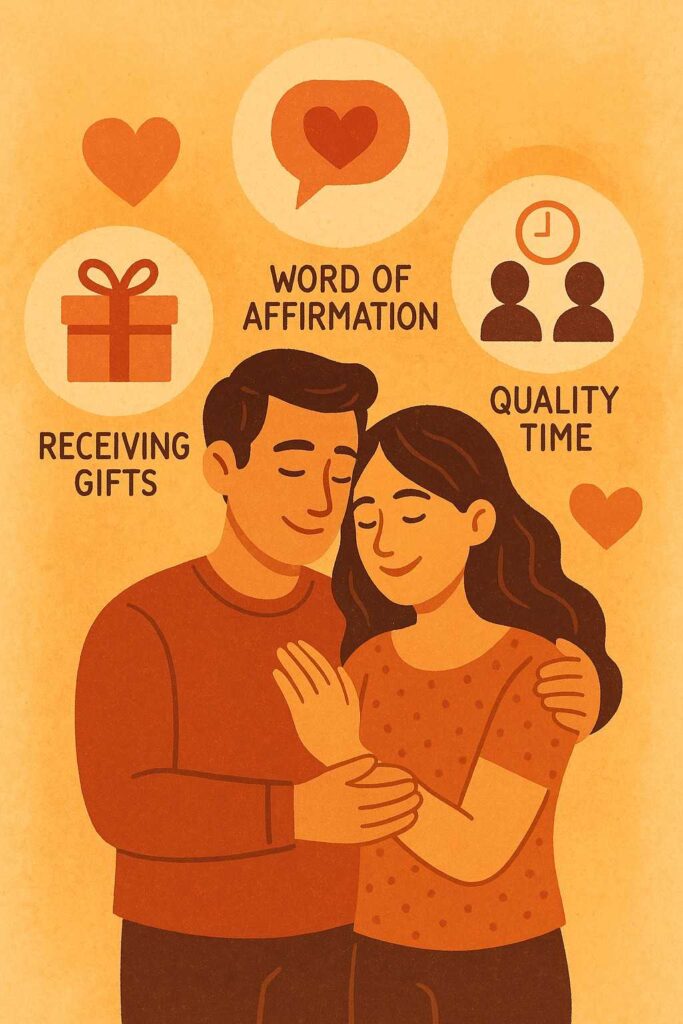Why is communication so difficult in relationships?
It is all straightforward: you speak, they listen, you listen, they speak. In practice, feelings and past life, and unexpressed requirements tend to interfere. One word could start a fight, and loneliness could seem the same as rejection. I have found that the majority of relationship problems are not due to a lack of love, but more of a lack of knowledge in how to express love. This is why I think communication is not just a skill; it is the heart of every good relationship.
Many couples struggle because poor communication turns into recurring conflict. Learn more in our guide on unhealthy conflict in relationships.
I am Anna Welch, a U.S citizen and writer with years of experience in studying how people connect. That is why I know about the difference that the right guidance makes. Books have been my tutors and have assisted me in not only unraveling the process of speaking coherently but also listening compassionately and responding empathetically.
In this blog, I will lead you through the best books on communicating in relationships so you can identify those tools that suit each individual best.
Toxic patterns often start with the way partners talk to each other. Our post on toxic vs healthy relationships explains this further.
How Well Do You Know Your Partner?
20 fresh questions, 4 stages. Be honest for an accurate snapshot.
What Are Books About Communicating?
They are how-to manuals authored by more professional authors, therapists, researchers, and sometimes real couples themselves, aimed at entering into a relationship so as to be happier. It is not a book to tell you how to talk better, but it goes into depth in explaining the psychology of love, the science of emotional needs, and the dynamics that can make or break a partnership. They offer some tips on listening more closely, emotion without blame, and conflict resolution with affection, in addition to long-term closeness.
The books can be recommended to build a better relationship, regardless of whether the person is single and dating or married. They present you with relevant exercises, life scenarios, and verified patterns of how to deal with bad habits, mend broken trust, and build emotionally closer bonds. In summary, relationship communication books are the relationship coach that fits in your palm to impart wiser communication in your relationship.
Read Also: What Is October 1st For Relationships?
1. Nonviolent Communication by Marshall B. Rosenberg

Nonviolent Communication (NVC) is not just an approach to communication; it is a mindset that could transform couples to come together. Rosenberg explains that in the majority of conflicts, it is not bad intentions but failed communication of a need and unappreciated emotions. Rather than criticizing or placing blame, NVC teaches you how to observe clearly, be honest about what you feel, and communicate respectfully about needs.
Such as opposed to saying, “You do not listen to me,” say instead, “I feel like when I talk, I am not heard, and I require more attention when talking.” Such a slight change transforms an attack into a request to understand.
I find this book particularly helpful in stopping voiceless sophistries. Whenever you and your partner seem to be in a similar scouting conflict, NVC teaches you to introduce calm, empathy, and actual solutions. It does not apply only to couples; it is a life skill that can bring sensitivity to any relationship.
Read Also: What Does The Bible Say About Dating?
2. Say What You Mean by Oren Jay Sofer
Communication is not sometimes a failure because we do not possess the words, but the cause is that we do not possess presence. Say What You Mean offers couples a simple way to speak and listen using mindfulness skills and practical communication ideas. Sofer emphasizes that clarity, benevolence, and mindfulness are paramount in talking about sensitive issues.
Good communication is also effective in showing what love is like to a man, because men show feelings in different ways.
The book rests on three legs: presence, clarity, and intention. To be in the moment does not mean being distracted or defensive. Clarity is to say what you mean, without wrappings of frustrations. Intention refers to paying attention to connectivity, not to being right.
I like about this book is that it makes you move slowly. You learn not to jump into a conversation or make emotional reactions, but to take a pause and respond. Every time you feel you are saying the right thing in the wrong way or your partner is not understanding you, then this book will come to your rescue.
3. Difficult Conversations by Douglas Stone, Bruce Patton, and Sheila Heen
We all have those dialogues we do not want to have, which are around money, trust, family, or intimacy. Difficult Conversations shows you how to be honest and to give care to such moments. The authors, negotiation experts from Harvard, explain that tough talks don’t have to end in disaster; they can strengthen relationships if approached wisely.
One of the more crucial principles is to focus on contribution rather than blame. You each examine how you have contributed to the situation rather than worrying about “who was wrong.” The other useful tip is that sometimes what we do not say is more important than what we do.
This book transformed how I handle sensitive issues. I was once afraid of raising issues, but then I realised it is an opportunity to learn and develop together. When you avoid conversations due to a fear of conflict, the book will teach you how to confront them and not lose love.
Check Also: Are You Falling in Love With the Wrong Person?
4. Crucial Conversations, 3rd Edition by Joseph Grenny and Team

Negative things are said sometimes in conversations, and the way it will be used will determine how much they affect your relationship. Crucial Conversations is about dealing with these moments of stress effectively. Whether it is trust issues, crucial life choices, or serious conflicts, this book teaches how to talk when you have the most on the line.
The key structure consists of beginning with the heart (what I desire), creating the safety so both partners are free to communicate, training your emotions before you speak, and acting. What sets this book apart is its focus on creating safety, because when people feel attacked, they shut down.
I think of this book as a toolkit for emotional emergencies. It doesn’t just tell you to “stay calm,” it gives practical steps to keep the conversation productive. When you and your significant other fight at the most crucial time, this book can turn breakdowns into breakthroughs.
5. The Seven Principles of Making Marriage Work by John Gottman
Few books come as supported by research as John Gottman’s The Seven Principles for Making Marriage Work. Gottman has studied thousands of couples over decades and found the habits that make relationships work and the behaviors that lead directly to divorce. His suggestions are workable, scientific, and simple to implement.
They are nurturing admiration, turning towards small bids towards attention, managing conflict constructively, and creating shared meaning. Rather than striving to have a relationship with zero fights, Gottman suggests filling emotional bank accounts by replacing negative interactions with positive ones of kindness, respect, and curiosity.
I like the novel because it is simultaneously emotional and scientific. It demonstrates that good marriages are not made on the large feats but on small, unselfish efforts. This is one of the most effective books on relationship communication if you want to know more about how to make love last.
Alongside Gottman’s principles, you may also want to explore our breakdown of the 7 Qualities Of A Healthy Relationship.
6. Eight Dates by John & Julie Gottman
Uniquely, Eight Dates is an interactive relationship book. It encourages couples to take eight designated dates that aim at addressing the following issues: trust, conflict, money, family, adventure, spirituality, and dreams. All the dates have questions that are set so as to initiate inspiring discussions.
The concept is very straightforward; simple talks in an intentionally safe environment can help improve intimacy. Rather than waiting to identify issues, you investigate areas of priority. It is fun the Gottmans’ way; you will not just be reading about communication, you will do it with your partner.
I think this book is especially helpful if you feel stuck in routine or surface-level chats. The guided cues bring out other sides of your partner that you may have never known. When you desire to revive interest and enhance bonding, communicating with this guide is more practical, fun, and even romantic.
7. Hold Me Tight by Dr. Sue Johnson
The foundation of Hold Me Tight is Emotionally Focused Therapy (EFT), which views love as an attachment-based bond of feelings. Sue Johnson states that arguments are never about those superficial details, such as chores or money, but about whether we feel loved, safe, and attached.
The book talks of seven transformative conversations between couples that can be had to create secure bonds. It helps you identify unhealthy patterns (such as follow-pull or blame-defend), and substitutes new security in emotional interaction. It stops being a fight to be heard; instead, you learn to respond with empathy/comfort.
When I am reading this, I find that it is more of communication and not of words. Johnson shows that when couples feel emotionally secure, words flow more naturally. If you’ve ever felt distance despite “talking things out,” this book explains why and shows you how to reconnect at the deepest level.
Healthy bonds are built on safety and respect. For contrast, see our biblical perspective on emotionally abusive husbands.
8. Attached by Amir Levine & Rachel Heller

Why do some people shy away from intimacy while others hunger for it? Adult attachment theory is used to analyze the attachment responses. It explains three main styles: secure, anxious, and avoidant, and how these influence communication in relationships.
If communication is breaking down and it’s even affecting intimacy, you might want to explore what to do when your wife avoids closeness.
The book shows how anxious partners often seek reassurance, while avoidant partners may withdraw, creating cycles of conflict. Secure partners, by contrast, balance independence with intimacy. By identifying your style and your partner’s, you can understand patterns instead of misinterpreting them.
What I appreciate is the practical advice for mismatched pairs. As a different example, when you are anxious and your partner is avoidant, the book has strategies to get out of the chasing and retreating cycle. It is quite eye-opening because it helps to understand that many of the struggles in communication are not individual but based on attachment. Relationships always feel like push-and-pull, right? This book brings clarity to the situation.
Learning about attachment styles can enhance dating as well. Look at our dating tips for men as useful tips.
9. Getting the Love You Want, Revised by Harville Hendrix
Getting the Love You Want introduces Imago therapy, which suggests we’re drawn to partners who reflect parts of our childhood experiences. The theory behind it is that childhood issues manifest themselves in relationships, creating repetitive issues.
Hendrix is a teacher of couples offering advice on how to identify these unconscious patterns and to make conflict a healing, rather than a damaging experience. Perhaps the most useful tool is an Imago Dialogue, a structured conversation method that allows partners to pay attention, validate, and empathize without interruption and judgment.
The fact that this book was combined with psychology and a practical nature makes it powerful. It not only prescribes issues; it is step-by-step, so you can apply it at home. I would recommend this book to couples who feel like they are locked in a loop and do not understand why. It aids you in transforming those cycles into healing and close connection moments.
Check Also: What Is Your Partner REALLY Thinking About You?
10. Set Boundaries, Find Peace by Nedra Glover Tawwab
The problem with most facets of communication is the vague or neglected boundaries. When you define boundaries and find peace, things become clear what limits a healthy relationship must have. Without them, miscommunication, burnout, and resentment grow.
Tawwab describes what emotional, physical, time, and other boundaries are and how to draw them in respectful manners. She also tends to the guilt people experience when they start to present their needs, providing ways to present their needs calmly and strictly.
As another example, you can leave an explanation, such as, “I need an hour after work to myself before I am ready to talk.” direct, to the point, and liberating.
I think this book is obligatory to read when you frequently feel neglected and overwhelmed. Boundaries cannot be walls, but bridges that can guard your well-being and strengthen your relationship. This book shows you how to set them without fear of rejection or conflict.
11. Thanks for the Feedback by Douglas Stone & Sheila Heen
Among the most misleading aspects of relationships is feedback. In the case of habits, attitudes, and behaviors, it will tend towards defensiveness and hurt feelings. Thank you. The feedback teaches how to provide and receive feedback in a way that strengthens the bond between the two parties.
Three categories of feedback are described by the authors: evaluation, coaching, and gratitude. They also develop universal triggers that induce negative reactions in us, like when we feel judged or misunderstood. By knowing them, you can put on hold, analyze, and react more freely.
What stands out is the focus on receiving feedback. Instead of resisting or dismissing it, you learn how to hear the message without feeling attacked. I’ve found this especially valuable because every couple has to address change at some point. This book gives you the tools to do it without turning feedback into a fight.
12. The 5 Love Languages by Gary Chapman

According to Gary Chapman’s The 5 Love Languages, one of the most popular books on relational communication, the five love languages are physical touch, gifts, service acts, words of affirmation, and quality time. The trick is that most individuals have a primary love language, and unless your partner can learn to speak this, you will not feel loved when he or she does not.
As an example, when your love language is quality time, and your partner uses a gift to express love, you will miss each other. Chapman teaches you to discover your love language and your partner’s language and adjust your behavior to the needs of both.
I connected with this book because it provided an understanding of why well-meaning plans do not always work. Couples speaking different languages do not communicate. Once you learn and practice about love languages, then it will be easy to love your partner in the manner they expect.
Read Also: Native American Dating Online
FAQs:
Why are communication books important in relationships?
They inform couples about each other, reduce conflicts, and strengthen their emotional connection.
A red flag is usually hidden and is poor communication. Signs to watch are in our guide on relationship red flags.
Which book is appropriate for beginners?
The first step to appreciating differences in communication is Men are from Mars, Women are from Venus.
Are these books only for couples?
No, many also help with friendships, family bonds, and workplace communication.
Should I read alone or with my partner?
Both work; reading together encourages shared growth, but even reading alone can spark positive changes.
Some couples choose to read together after trust has been broken. If infidelity is part of your journey, our post on infidelity guilt may help.
Final Words:
In any healthy relationship, efficient communication is the pillar. These books are not merely guides; they are aids to assist you in listening better, expressing yourself better, and creating closer emotional connections. Wherever you are on your path, recovery, developing, or just have a desire to see more, these books can be a great companion. Keep in mind, it is not about being perfect with communication; it is about the progression, being patient, and trying.
You begin with a single book that is inspiring, and practice what you read, and you will see how gradually your relationships change. The proper marriage counseling book is the first step to finding healing, growth, and intimacy. The books offer easy materials and ideas for strengthening a relationship between couples.


